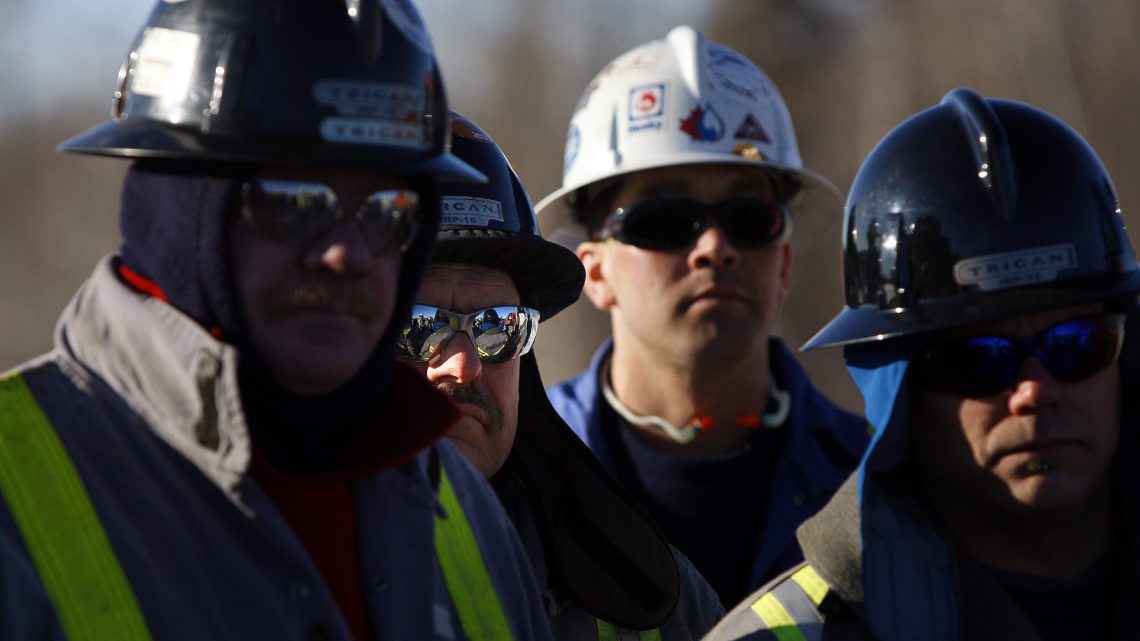
How to Persuade Workers It’s Time to Move on From Oil and Gas
April 1, 2020This article originally appeared on VICE Canada.
In recent years, the rapid ascent of renewables has eaten into an ever bigger share of the global energy market. Even back in 2018, think tanks were projecting fossil fuel price declines, competition, restructuring, and stranded assets.
With the onset of the COVID-19 pandemic, however, the carbon sector is truly beginning to spiral: U.S. crude prices have sunk below $20 a barrel and widespread job losses are now all but guaranteed.
In the face of this unprecedented crisis, what can climate campaigners do to convince workers in the oil and gas industry that it’s finally time to move on?
They could start with a sobering dose of economic realism.
That, at least, is the key lesson from the federally mandated phase-out of coal in Alberta—a process that will pretty much eliminate coal-powered energy in the province by the end of this decade.
“One of the most compelling things the Alberta Federation of Labour found when they were talking to coal workers is that none of the positive stuff works,” Hadrian Mertins-Kirkwood, a senior researcher with the Canadian Centre for Policy Alternatives, told VICE.
“What resonated with people was not that it’s good for the environment and you’ll get a better job, but that it’s going to happen anyway. The world is moving on from coal and that sucks. So what comes next?”
Oil and gas directly supports around 170,000 jobs in Canada and almost a million in the United States—two of the world’s most carbon-heavy economies.
Industry workers form an important power bloc in both of these countries and are, like public opinion at large, split over how best to tackle the challenge of climate change.
Many labor unions in B.C. and Alberta backed the Trans Mountain and LNG pipeline developments—which environmentalists say which will massively increase Canadian carbon emissions—on the grounds they will be good for jobs and investment.
And in Illinois last year, labour organizers urged state legislators to endorse a bill that would impose penalties on climate activists who tampered with local energy infrastructure, including coal mines and gas pipelines.
But there’s growing recognition, too, that employment in the oil and gas sector is going to become less secure as the climate crisis intensifies and the planet moves towards renewable energy consumption at the expense of fossil fuels.
“Renewables are set to penetrate the global energy system more quickly than any fuel in history,” a report by the oil giant BP acknowledged in 2019.
“It took 45 years for oil to increase from 1 percent of world energy to 10 percent … renewables (will go) from 1 percent to 10 ten percent in 25 years.”
Catherine Abreu is the executive director of Climate Action Network Canada, a coalition of more than 100 environmental groups across the country. She thinks job instability is hardwired into the oil and gas sector because extractive industries are prone to aggressive cycles of boom and bust.
“One of Canada’s major vulnerabilities is not only our runaway addiction to consuming fossil fuels but also our economic reliance on volatile fossil fuel markets,” she told VICE.
An expansion in green energy production could help “build resilience” into the Canadian economy, Abreu said.
“We need to be clear that when (environmentalists) criticize oil and gas, we’re not criticizing the people who work in it; we’re criticizing the profit model it operates on, which tends to privatize all the benefits of the industry and socialize all the costs.”
The volatility of international energy markets has been on full display in recent weeks as COVID-19 has brought economies around the world to the brink of recession.
Alberta’s economy is expected to shrink by 5.5 percent this year and the provincial unemployment rate could soon be twice that; meanwhile, two out of every five oil companies in Texas—which produces 42 percent of all America’s crude oil—say they are at risk of going broke within the next 24 months.
This slump will mean mass layoffs in a sector still recovering from the last oil price crash in 2014 and 2015, which resulted in up to half a million redundancies worldwide.
But as Prime Minister Justin Trudeau and President Donald Trump line up multibillion-dollar bailouts for oil interests on both sides of the border, climate activists argue that the crisis provides a chance to implement radical environmental initiatives like the Green New Deal, thus accelerating the shift away from fossil fuels.
“We needed a Green New Deal to ensure a just transition for workers before the coronavirus hit and oil prices collapsed,” Sofie Karasek, a spokesperson for the Sunrise Movement, the influential climate action group based in Washington D.C., told VICE.
“Now, with the economy in free fall and millions of people out of work, including in extractive industries, it's more urgent than ever.”
According to Karasek, an extensive program of state-led investment in green energy wouldn’t just help slash carbon emissions in the face of rising global temperatures.
It would also deliver vital financial support to oil and gas workers in the midst of a severe economic downturn, not least by creating thousands of new green jobs.
Governments face a choice, she said: They can “respond the way (they) did in 2008, by bailing out executives and leaving everyday people behind, or enact policies rooted in values of compassion and respect. The Green New Deal is the only economic stimulus plan that meets this moment.”
Hassan Yussuff is the president of the Canadian Labour Congress and co-chaired the federal government’s Just Transition Task Force for Canadian Coal-Power Workers.
Like Karasek, he believes a Green New Deal would be the best way to confront the climate crisis and alleviate job insecurity in the energy sector.
But it’s equally vital, he says, for fossil fuel workers to be included in the decision-making process—and for governments and campaigners to avoid imposing solutions technocratically, from the top down.
“I have been across the country talking to workers who accept the science (of climate change) and support action to protect the planet, but these workers are also real people with families and bills to pay,” he told VICE.
“They have faced disruptions before and they have to be given the opportunity to shape their own futures. They didn’t create this problem and they deserve to be at the table.”
Some employees are already taking the initiative.
Lliam Hildebrand was an infrastructure worker on the Alberta oil sands in 2015 and saw many of his colleagues laid off in the wake of slumping oil prices and vanishing investments.
After that experience, which he describes as “terrifying,” he decided to set up a new organization—Iron & Earth—dedicated to helping “oil and gas, coal, and Indigenous workers” apply their expertise to Canada’s fast-growing green economy.
In an open letter to Trudeau at the start March, Iron & Earth highlighted the fact that asset managers working on behalf of 1,200 institutions around the world had divested more than $14 trillion from the fossil fuel sector over the past eight years and reallocated it into low carbon projects.
This, the letter said, demonstrated that oil and gas workers shouldn’t have to face redundancy every time money from fossil fuels companies dried up but, with the right support, could easily transition into more sustainable industries. “We must stop using the spectre of economic decline as a reason for continuing with the status quo,” it stated.
Hildebrand thinks oil and gas workers are open to the idea of phasing out fossil fuels quickly but want to be reassured that their livelihoods aren’t going to be discarded overnight.
They also want the environmental lobby to acknowledge how transformative work in the carbon sector, which is often highly skilled and well paid, has been for huge numbers of people.
“As workers, we are genuinely grateful for the opportunities provided to us from the oil and gas industry,” he said. “Our vision is not that the oil industry should be shut down immediately but that a responsible transition is required.”
Still, with just a decade left to keep global temperature rises below an apocalyptic 2 C—and with many major economies, including Canada and the U.S., set to miss their carbon reduction targets again this year—it’s clear that fossil fuel jobs will have to go sooner rather than later.
The challenge for environmental campaigners is to find a way of turning oil and gas workers into allies in the fight against climate change—instead of adversaries—as this process takes effect.
“The science is clear that the vast majority of oil and gas needs to stay in the ground,” Katherine Trebeck, a U.K.-based political economist who has written about the relationship between economic growth and the environment, told VICE.
“But change isn’t just about reacting to the science. It’s also about understanding the human concerns of workers and their families.
“That means starting conversations and coming together to think through what’s needed—before we hit the climate crisis cliff edge.”
Follow Jamie Maxwell on Twitter.


